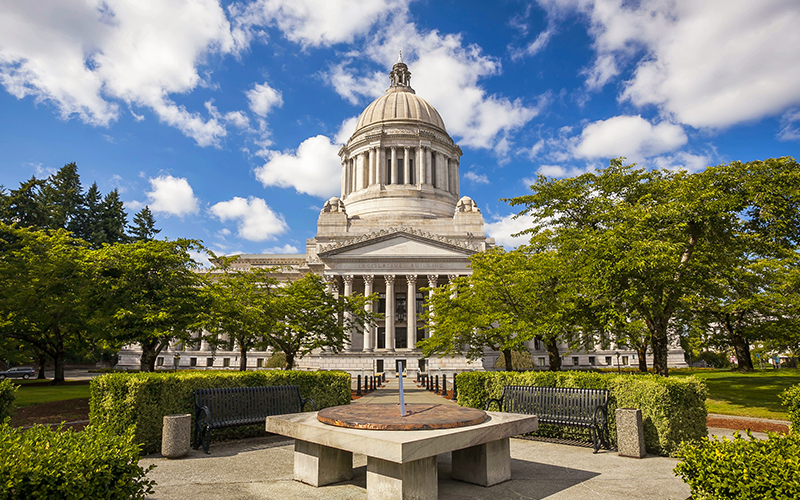By BRIAN MINNICH
Executive Vice President
The Washington State Supreme Court has announced it will hear arguments on Jan. 26 to consider whether — as previous courts have concluded on at least two previous occasions — the state’s constitution prohibits a graduated income tax.
The Democratically controlled Legislature last year passed — and Gov. Jay Inslee giddily signed into law — a measure intended to punish the state’s high earners by imposing a 7 percent tax on income from capital gains above $250,000 a year, such as profits from stocks or business sales.
Exceptions include the sale of real estate, livestock and small family-owned businesses.
The Washington State Constitution, however, states unequivocally that such taxes must be applied uniformly and cannot exceed 1 percent without voter approval.
Backers of the tax describe it as an excise tax, but previous court decisions have consistently regarded income as property — which must be taxed at the same rate for everyone.
“The court settled this question in 1933 with Culliton v. Chase,” said Eric Stahlfeld, chief litigation counsel for the Freedom Foundation, which teamed with the Seattle law firm Lane Powell, PC, to file a legal challenge to the new tax even before the governor’s signature was dry.
This latest law breaks no new legal ground, he noted, and lawmakers know it.
The Left and its allies in public-sector unions have been trying to create an income tax in this state for decades. All they did this time is try to give it a different name, but the constitution is clear.
As is the will of the people.
Washington residents have rejected income taxes of all kinds no fewer than nine times since the 1930s, most recently in 2010, when 64 percent of the voters killed Initiative 1098, which would have imposed an income tax on Washingtonians making more than $200,000 — and no one else.
The irony is that the Left could pass a state income tax tomorrow if they made it a flat, 1 percent tax. But that’s not what this is all about. They see the tax not just as a new revenue source to further enlarge government, but as a weapon to use against their political opponents.
Even as the capital gains income tax lawsuit has languished in the courts, Washington state budget analysts last February projected tax revenues for the 2021-23 biennium would exceed previous expectations by nearly $1.45 billion.
We don’t have a revenue problem in this state. Instead of finding new ways to punish people for their success, Washington lawmakers should be finding ways to cut taxes they apparently don’t need.
The Freedom Foundation/Lane Powell lawsuit was filed in Douglas County Superior Court on behalf of 10 plaintiffs in April 2021. Judge Brian Huber saw through the state’s subterfuge and ruled this past March in favor of the petitioners.
He wrote:
“As a tax on the receipt of income, ESSB 5096 is also properly characterized as a tax on properly pursuant to that same caselaw. This court concludes that ESSB 5096 violates the uniformity and limitation requirements of article VII, sections 1 and 2 of the Washington State Constitution. It violates the uniformity requirement by imposing a 7 percent tax on an individual’s long-term capital gains exceeding $250,000 but imposing zero tax on capital gains below that $250,000 threshold. It violates the limitation requirement because the 7 percent tax exceeds the 1 percent maximum annual property tax rate of 1 percent.”
Rather than simply follow normal procedure, however, Washington Attorney General Bob Ferguson bypassed the Appeals Court level and petitioned the state Supreme Court to take the case directly.
Ferguson and the governor don’t work for the voters of this state. They work for big special interests like government employee unions. The more tax money the state generates, the more dues-paying public workers the unions can hire. And the more dues they rake in, the more political influence the unions can buy and repeat the process all over again.
The Freedom Foundation was there in 2016, when Olympia voters handily defeated a ballot measure would have imposed an income tax of 1.5 percent on households with incomes of $200,000 or greater. We filed a lawsuit again in 2017, when the city of Seattle adopted an ordinance — later ruled unconstitutional — that would have levied a 2.25 percent tax on city residents earning more than $250,000 per year.
In the final analysis, we are confident the State Supreme Court will rule in our favor and strike down this punitive, unconstitutional tax scheme. Rest assured, the Freedom Foundation is committed to seeing this important legal battle through to the end.












